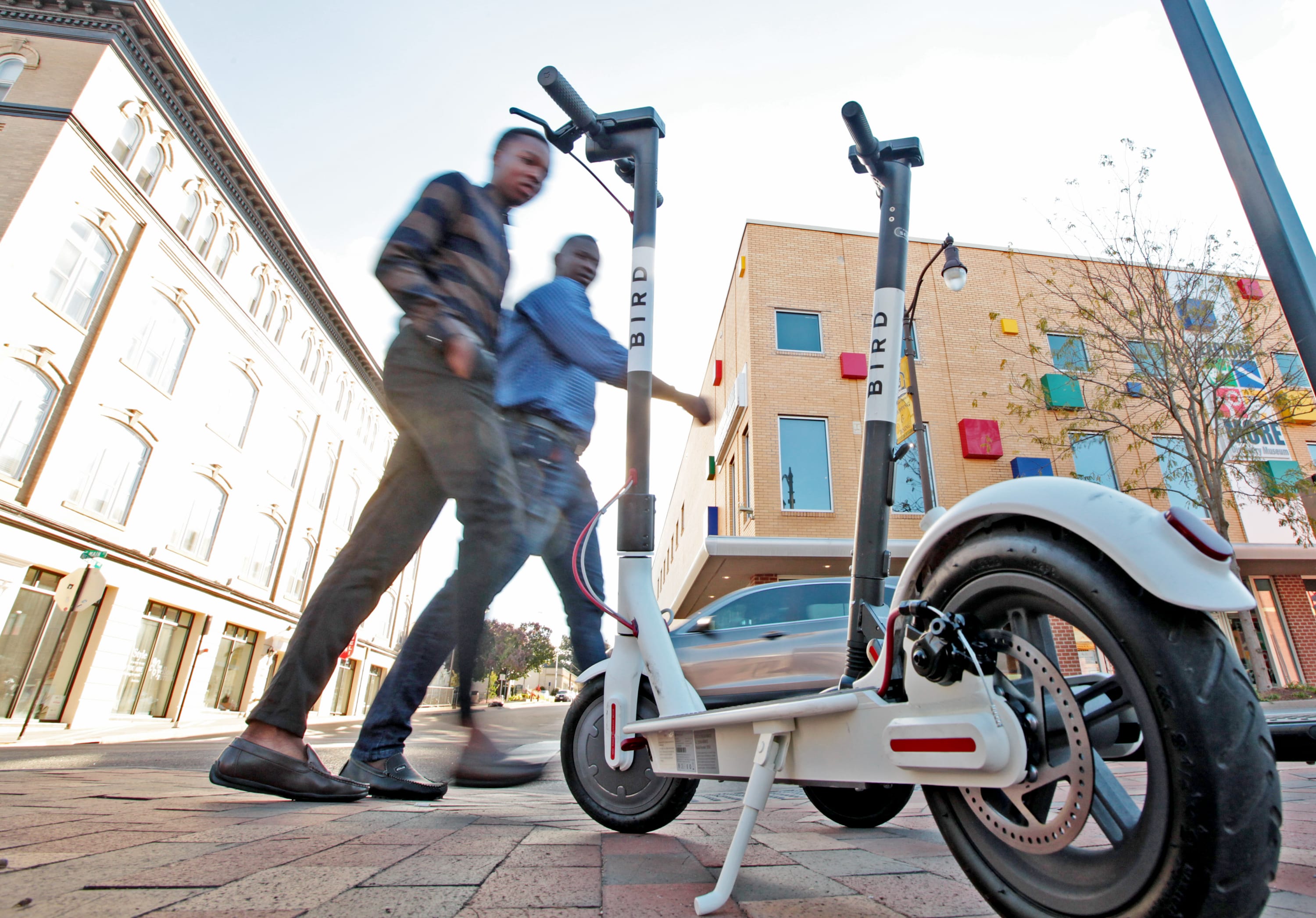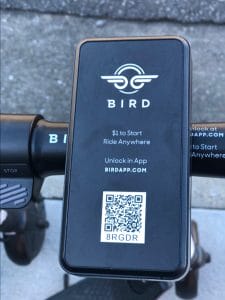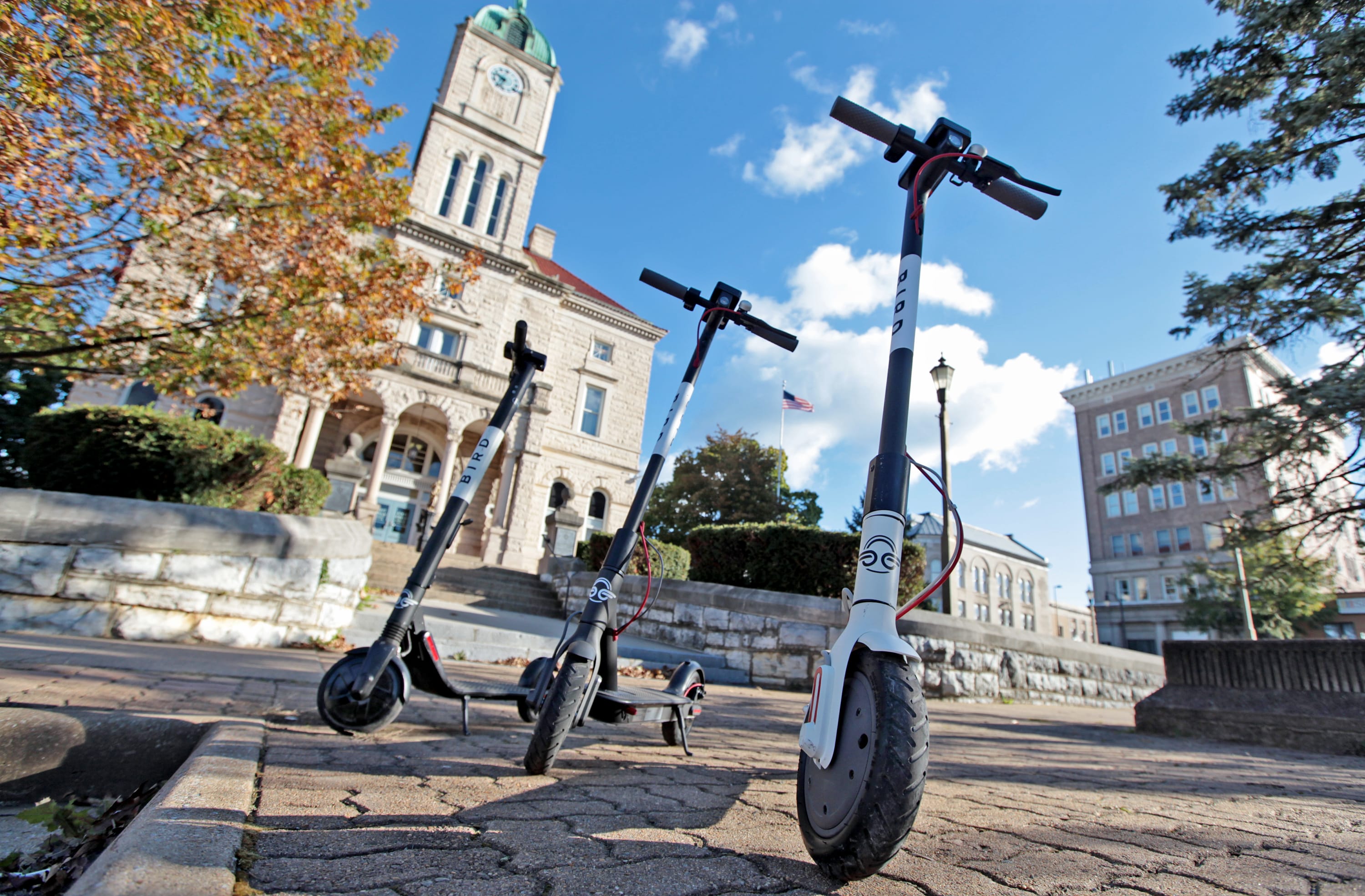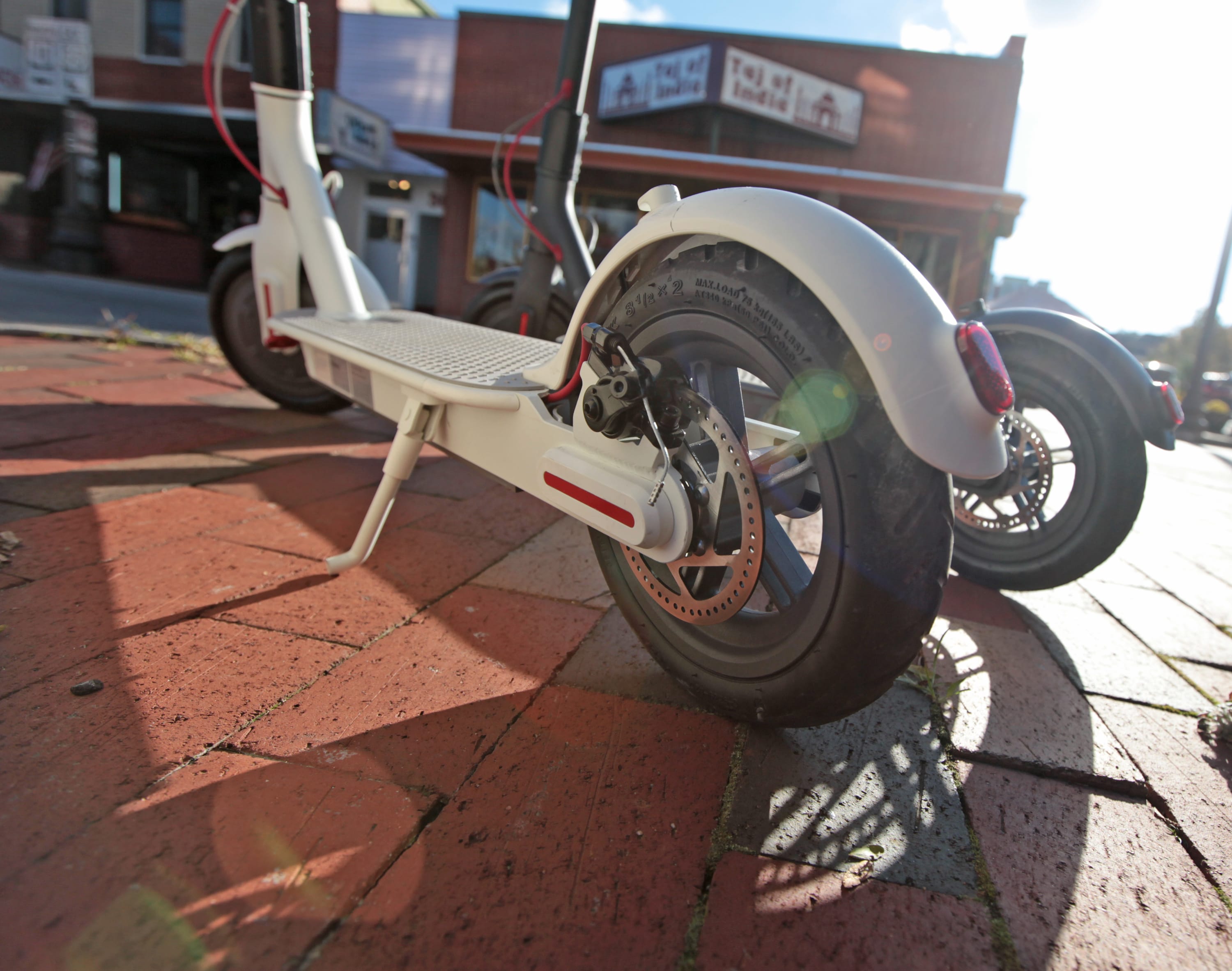By Bridget Manley, contributor // Photos by Holly Marcus
The army of rentable scooters that began ambling down Harrisonburg’s streets this month brought another element of the gig economy to the Valley, including all the questions that go along with a new service: How are they regulated? What are the safety implications? And is this going to alter daily life?
The scooters suddenly popped up on Harrisonburg city streets early on Oct. 12—their thin black and white emblazoned with the word “Bird” in sleek font. The small rectangular box that perches atop the handlebars read simply: “BIRD. $1 to Start. Ride Anywhere. Unlock in App.”
City residents, JMU students and local police were quick to notice.
Within a week, students were buzzing around town on them, prompting JMU sent a campus-wide email to students about the safe use of scooters on campus. Harrisonburg residents started spirited debates on social media about the pros and cons of scooter shares. And the topic even came up during the Harrisonburg City Council Candidates Forum Oct. 17.
Kyle Lawrence, executive director of the Shenandoah Valley Bicycle Coalition, said there are valid concerns about the safety, effectiveness and visual appeal of the scooters. But he said he hopes city officials and residents give the scooters a chance and don’t quickly jump to regulating them—such as requiring helmets or banning them from the city—until people have had an opportunity to live with them for a while.
The scooters raise other questions: Is this the future of transportation in Harrisonburg? Will electric scooters and bike share programs change transportation in and around cities and towns permanently? Lawrence said he hopes the answer is yes to both.
“People from other cities are already accustomed to this,” Lawrence said. “They say ‘yeah, that’s how we get around.’ This isn’t a crazy idea.”

Bird is one of the companies that offer electric scooters in cities across the country. These scooters, freshly charged the night before, wait for commuters along S. Main Street Wednesday morning.
Whispers on the street
Bird Rides Inc., based in Santa Monica, Calif., launched its scooters in large cities like New York and Baltimore a few years ago. When the model worked, Bird expanded to more than 50 cities nationwide, including three others in Virginia: Richmond, Virginia Beach and Arlington. The company posts directions about how to use its services on its site.
Many people, including Lawrence, thought it was inevitable that Bird would move to smaller cities with large universities like Harrisonburg.
The City Commissioner of Revenue confirmed that Bird received its business license to operate in Harrisonburg on September 7 but would not release any more information about it.
Lawrence said he heard the scooters were out on the street on Friday, Oct. 12. He opened the app at work, saw a few geolocated outside, and went out to try one. He said he sees the scooters working in tandem with bike-share systems that he anticipates coming to the city soon.
Lawrence said Hotel Madison already expressed interest in having a “nest”—a placement point of scooters each morning—outside the hotel for tourists to take around town each day.
Richard Smith, assistant manager for Hotel Madison, confirmed the hotel’s interest in becoming a nest.
“We are a green property and focus on recycling and sustainability efforts, and we see it as another opportunity unity to continue that as well as give our guests alternative ways around town,” he said.
When asked to comment on why the company selected Harrisonburg, a representative for the company responded with a general press release about the use of scooters but did not answer The Citizen’s questions.
Growing pains
Before the scooters even landed in Harrisonburg, the company faced controversy over the implementation and safety of the devices. The city of Richmond banned the use of scooters after several hundred landed on streets in the city without permission from city officials, and Richmond officials and Bird representatives still haven’t reached an agreement on their use. In a class action lawsuit filed last Friday in California, plaintiffs are accusing Bird and other scooter companies of gross negligence because of injuries sustained by their use.
The Washington Post reported that the company says that the complaint has been brought “against the entire e-scooter industry” and said shared e-scooters have become an important transportation mode “for hundreds of thousands of people in 100 cities worldwide.”
Lawrence, as well as Harrisonburg City Police officials say the scooters are operating in a space that hasn’t been regulated yet.
Harrisonburg Police Intelligence Officer Scott Drugo said the police can’t arrest or  ticket anyone not wearing helmets, operating while intoxicated or using the scooters irresponsibly. He said police are hoping that common sense and obeying the rules of the road help in reducing injury and keep everyone safe.
ticket anyone not wearing helmets, operating while intoxicated or using the scooters irresponsibly. He said police are hoping that common sense and obeying the rules of the road help in reducing injury and keep everyone safe.
“I’m worried about the safety of everyone—on and off the scooters,” Drugo said. “Treat them like a bicycle—ride in bike lanes, with traffic, not against traffic, follow the rules of the road, and wear a helmet.”
One major concern Drugo had was people using scooters while intoxicated. However, Lawrence said the scooters shut off every night around 9 p.m. so designated “chargers” can collect them to plug in overnight. The small group of “chargers” then place the scooters back on the street the next morning.
Both Drugo and Lawrence agree the scooters shouldn’t be used on sidewalks, both for the safety of pedestrians and the safety of scooter riders. They urge riders to use bike lanes when appropriate and for vehicle drivers to share the road.

These three scooters are just a few of about 20 that are parked in and around Court Square Wednesday morning. Bird is one of the companies that offer electric scooters in cities across the country.
“Become a charger!”
Like many companies born of the sharing economy, Bird relies on a network of motivated independent contractors, in this case called “chargers.”
Many local Facebook users this month started noticing the ads in their feeds: “Want to make money while you sleep? Become a charger!”
Bird pays people to collect the scooters each night, change them at home, and drop them off at their “nests” each morning.
Lawrence said he applied to become a charger, to better understand the entire process, in which a “charger” pays a deposit of $10 per charging cord, and when the cords arrive, that person gets access to the map of scooters.
Chargers begin their work each night: look at the map, find the scooters, collect them for the night, charge them at home and drop them by 7 a.m. each morning. Lawrence said chargers can do as many or as few scooters as they like each night, and the further a scooter is located each night, the higher the fee to retrieve it.
After learning that the scooters had hit the streets, JMU officials issued a campus-wide email stressing the importance of using the scooters safely and not leaving scooters on the sidewalks. JMU’s email also prohibited students from becoming chargers by using JMU’s power.
“On-campus housing contracts prohibit residents from using the residence hall, the assigned room or any equipment or facilities found in the hall or room for the purposes of conducting a personal business,” the email said. “Specifically, residents are prohibited from using university buildings to charge electric scooters for profit.”
While Bird hasn’t publicly said how much chargers” get paid, some people have blogged about their experiences, saying they made $20-$30 an hour.

The Bird e-scooters use a disc brake applied with a lever on the handlebars to stop. The scooters are limited at traveling 15 mph.
Changing The Way We Get Around
While Lawrence and Drugo both said the scooters can spark change in reducing the use of vehicles for transportation. Lawrence said he hopes the scooters prompt people to seek other options besides cars for getting around.
“We think getting people out of their steel boxes is how you interact with people,” he said. “You think about your community differently, see more businesses, have chance encounters, slower speeds, it’s safer, and that’s why this is part of the bigger picture.”
Lawrence said as more people ride bikes, walk and use other forms of transportation, cities follow suit with wider bike lanes and more green space.
“The way we see scooters are the same way bikes were introduced in the 1890s. Everyone said ‘We can’t have bikes in the city, there’s no place to ride them, they are going to scare the horses’…and the same thing with cars,” Lawrence said. “Technology is always going to lead, and we are always going to play catch up. We have to redesign our cities for the way people want to get around. People vote with their feet.”














